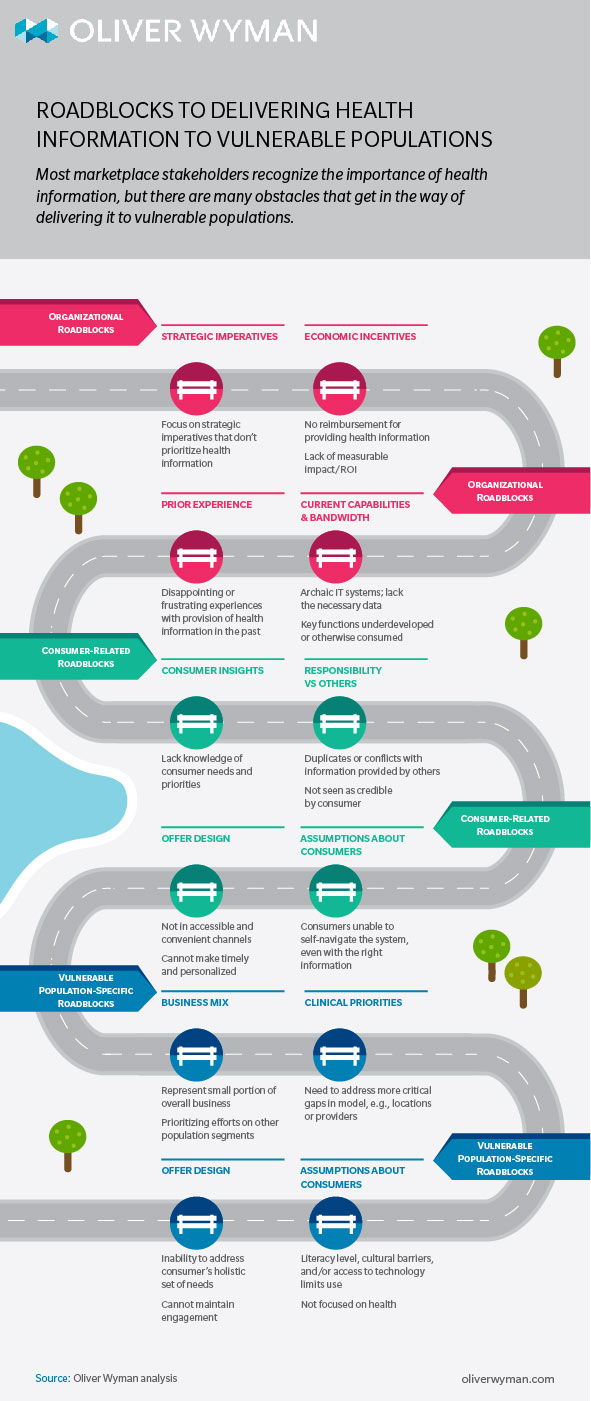Accessing healthcare information at the right time and right place can help people manage their health and make optimal use of their healthcare resources. The right information, used well, can enhance the efficiency and effectiveness of the entire healthcare system, and improve people’s health and quality of life.
However, as information becomes an increasingly important part of healthcare, there is reason to fear that vulnerable populations—especially Medicaid beneficiaries, low-income individuals, the uninsured, Spanish speakers, and family caregivers—are being left behind.
A major, multi-disciplinary study from Oliver Wyman and Altarum Institute, developed with support from the Robert Wood Johnson Foundation (RWJF), investigated how these vulnerable consumers search for and use healthcare information. It also explored marketplace perceptions of vulnerable consumers’ health information needs and how they are investing to address them.
The findings confirm a simple truth: Vulnerable consumers experience healthcare differently—whether it is feeling disrespected by doctors, difficulty finding sources of information, or fearing stigmatization for being immigrants. Most vulnerable healthcare consumers struggle to understand their options, their costs, and even the language around their care. The research also found that while most marketplace leaders acknowledge the need for better health information, few are taking steps to improve their offersings. This is due to competing priorities and lack of clear ROI.
By sharing the findings of the "Right Place, Right Time" study, Oliver Wyman, Altarum Institute, and RWJF hope to foster dialogue around the information needs of various consumer segments, and also drive true change in the marketplace to better serve those that need the most help navigating the healthcare information landscape.
Read the reports.
World Economic Forum Discussion
The study findings were released in conjunction with an Oliver Wyman-hosted panel discussion on this topic at the 2017 World Economic Forum. Learn more about the Davos event.
IN FOCUS
Key findings from the consumer research:For the consumer component, Altarum Institute conducted interviews with 65 consumers and a nationally representative mail and web survey of more than 4000 respondents.
Vulnerable consumers want more, better cost information:
- About 50 percent of respondents are not satisfied with healthcare cost information.
- The uninsured are the least satisfied, with 70 percent of uninsured respondents not satisfied.
Spanish speakers are reluctant to ask for resources in their language:
- Almost half of Spanish-speaking respondents say that language issues present a barrier when communicating with doctors.
- When resources are not offered outright, some Spanish speakers worry about prejudice and may seek a different care provider.
Many low-income patients in poorer health feel disrespected by providers and are less likely to trust healthcare information or follow medical advice:
- Nearly 40 percent of low-income consumers in poorer health felt disrespected.
- Patients feeling disrespected are three times more likely to believe doctors are inaccurate and two times more likely to not take their medications as directed, compared with patients who feel respected.
Patients seek clues to provider warmth through online patient reviews and provider photos:
- While only 42 percent of survey respondents had used patient reviews, of those that did, 83 percent say reviews influenced their choice of doctor.
- Respondents said respect and sensitivity are among the most important qualities in a physician, and they look for that in provider photos.
Caregivers are information “superusers”:
- Caregivers for children are nearly three times as likely to use a health app as non-caregivers (70 percent vs 25 percent).
For more insights, read the full report below.
Key findings from the marketplace research:
To assess marketplace perceptions of vulnerable consumers’ needs, as well as organizational priorities and investments, Oliver Wyman interviewed nearly 100 senior leaders from across the US health marketplace. Interviewees represented provider organizations, insurance companies, government agencies, health information companies, financial investors, and social services organizations. View our Marketplace Interview Guide. Oliver Wyman also assessed marketplace reactions to the consumer findings in a series of follow-up interviews.
There was a strong consensus across the stakeholder groups that health information for all consumers needs to be more accessible, understandable, and actionable:
- However, no organization saw providing health information to vulnerable consumers as a strategic imperative.
- It was not that health information was viewed as unimportant. Rather, it is that it was seen in terms of how it contributed to other imperatives.
Stakeholders see barriers to progress at every level of the healthcare system:
- Barriers include internal (organizational priorities and budget constraints) and external (regulatory challenges and lack of reimbursement).
- There also was pervasive concern over the intractable challenges of getting consumers, particularly vulnerable consumers, to engage with health information.
Stakeholders were surprised by some of the consumer findings, but were able to identify actionable responses:
- Because some Spanish speakers are reluctant to ask for Spanish-language materials, materials in both English and Spanish could be available.
- Because vulnerable consumers have difficulty with search language, information should be edited to simple-to-understand language.
- Because consumers look for signs of warmth in provider photos, more attention should be paid to online profile photos.
Despite the many challenges that organizations face in providing effective health information to vulnerable populations, we heard encouraging news in our interviews:
- Many stakeholders understand how health information needs to change to serve vulnerable populations’ needs, and many have a reasonable vision of who needs to do what going forward.
- We are encouraged by both the innovation that some market stakeholders are dedicating toward serving vulnerable consumers and their willingness to course-correct based on the insights from our study.
For more insights, read the full report below.

Our findings show that when it comes to providing health information to vulnerable consumers, there is a need for ecosystem-wide solutions; some of the obstacles or roadblocks are too great for organizations to tackle individually.Helen Leis, Partner, Health & Life Sciences, Oliver Wyman
More Study Findings
- Health Information and Vulnerable Populations: Health Information Companies
- Health Information and Vulnerable Populations: Health Plans
- Health Information and Vulnerable Populations: Providers
- Health Information and Vulnerable Populations: Financial Investors
- Health Information and Vulnerable Populations: Employers
- New Research: What Every Health Information Strategy Should Have
- New Research: 4 Keys to a Successful Consumer Health Information Strategy
- Health Information: Improving Access for Lower-Income Patients
Altarum Institute
- Knowledge is Power: Improving Health Care Information For The Most Vulnerable
- Overcoming Lower-Income Patients' Concerns About Trust and Respect From Providers
- Transparency in Health Care – How Did We Get Here, and What’s Next?
- Leveraging Patient Engagement with the New ACE-12
Robert Wood Johnson Foundation














